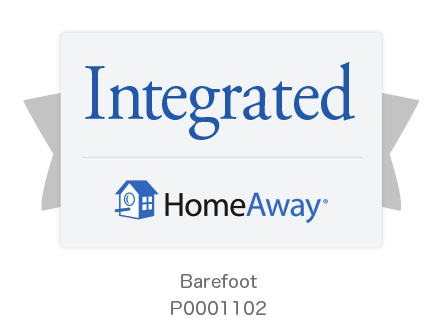Barefoot is growing again! We have brought on board a new Partner Manager, Janice Brunelle.
Read MoreBarefoot Technologies Blog- Vacation Rental Industry News
5 Takeaways from the Eastern VRMA Conference
Posted by Claiborne Yarbrough on May 4, 2015 11:33:38 AM
Well another Eastern VRMA show is under our belt. I took a couple of days to think about what I consider to be my top five takeaways from the show. You know that I try to keep our blog half about the industry and half about Barefoot, and the takeaways fall into this same pattern.
Read MoreBest Implementation Practices for Vacation Rental Software
Posted by Claiborne Yarbrough on Apr 16, 2015 2:49:00 PM
From time to time I try to highlight an aspect of Barefoot’s Vacation Rental Software solution when I think that I can make a good case that we are different in what we can bring to our customers. In this blog, I would like to focus on how we are different when it comes to a successful implementation.
Read MoreWhat Every Vacation Rental Manager Needs to Know (But the OTAs Aren’t Confessing)
Posted by Guest Author on Mar 31, 2015 10:00:00 AM
This blog was originally posted on Holiday Vacation Rentals by Alan Hammond found here
Professional vacation rental management companies are important to the growth of the industry and need to be careful that they don’t become minimalized to property service providers. Unfortunately, some of the large online travel agencies (OTAs) may be contributing to a perception that can undermine the value of the vacation rental manager to the industry.
The renting of vacation homes is a hospitality and guest services business that, among other things, is not and should not be confused with a cleaning service or depository for keys. In the race for competitive edge, control of the marketplace, and profit from vacation rentals, OTAs, rather than promoting management brands, often seem to undervalue or ignore altogether the importance of the professional rental management company’s role.
The primary objective of the OTAs is to increase returns to their shareholders. Their revenue strategies include increasing subscription fees, premium ad-placement fees, and transactional fees as a percentage of the rental rate.
While the future impact of OTAs in vacation rental distribution is uncertain, it is likely they will attempt to have rate parity, best rate guarantees, and no block-out dates to increase their profits as they grow in dominance. Currently, consolidation of OTAs is occurring as larger companies seek to maintain dominance and grow revenues, most recently evidenced with Expedia’s acquisition of Travelosity. Interestingly, Airbnb, a new entrant to the industry, has broken from the traditional OTA model by charging the consumer directly for the service provided, which has been met with high acceptance among users. Consumers appear to be willing to pay the transparent OTA fee for the convenience of using Airbnb as a one-stop service.
While some OTA distribution channels continue to sell listing ads, others are aggressively pushing transactional “Book It Now” integration to vacation rental managers as a necessity for better conversions. Professional managers that do not rely on OTAs know better.
A recent article by Tnooz reported that according to a SaleCycle survey, “conversion rates for those making a travel booking are generally low—often in the single digit percentage range”. The conversion rates specifically for vacation rentals are likely even lower since customers generally know what to expect when it comes to hotel rooms, while vacation rental homes are all unique and travelers have more questions they’d like answered before booking.
One of the most commonly cited reasons for the low online booking conversion is that travelers (in our case, renters) are still not ready to complete their travel booking. Price is a major factor in the decision as they feel a cheaper deal may be found elsewhere and continue shopping. OTAs may be finding themselves in a competitive struggle for consumer loyalty and to convert shoppers, which will drive more consolidation in the distribution industry.
Counterintuitively, OTAs may be conditioning users to look for a better deal elsewhere. Professional managers who do not give up control of their inventory to OTAs can benefit from higher conversion rates resulting from a better shopping experience and the ability to provide best rate guarantees when booking direct from a rental management company not encumbered by OTA agreements.
Another significant consideration is that shoppers will pay more for products and services they know. This is a compelling reason for vacation rental companies to commit resources to building a strong brand! Unfortunately, some OTAs are stripping the value of a vacation rental company’s brand from their ads.
While OTAs may bring parties together, after the initial introduction, these intermediary or “middlemen” have little to do with the actual sale and vacation experience. Large and increasingly predatory OTAs are neither the only source of rental inquiry nor the deciding factor in the purchase and guest experience.
OTA middlemen sometimes appear not to understand that the property manager doesn’t just take accept a booking in exchange for a key and clean the property on departure. Vacation Rentals are not a commodity sale. This misperception minimalizes the services that are regularly performed by professional vacation rental companies to a function of caretaking, rather than recognizing them as managers of guest services and experiences that are essential to the vacation rental industry and which will become increasingly important if vacation rentals are to be recognized as a preferred accommodation type by travelers.
Not only are OTAs overrated as “necessary” for booking conversions, but according to the American Hotel & Lodging Association’s (AHLA) comprehensive study on distribution channels, OTAs do not create demand or raise overall occupancy. Rather, OTAs shift demand from one market or property to another, capturing a middleman fee in the process. This raises costs to the rental property managers. These costs are then passed to the property owner and, ultimately, to the consumer in the form of higher rental rates.
The practices of the OTA should be understood, and companies that choose to use them need to carefully manage how they do so. As OTAs grow in dominance in online search, they can bring a significant additional cost the rental guests that use them.
In time, market forces will impact the role and value of OTAs similarly to the changes that occurred in the hotel industry as hotelbrand.coms better managed their use of distribution channels and avoided high OTA fees by improving their online marketing and using customer loyalty programs.
Currently in Europe, OTA rate parity is being challenged under antitrust regulations. Some hotel brands have begun providing a comparison of intermediary and direct rates on their websites, dispelling consumer perceptions that shopping via OTAs will result in a better price and increasing brand direct conversion rates.
While OTAs change pricing models and strategies, vacation rental management companies need to remember that guest services are critical to successful management in the hospitality business.
Professional rental companies are in the customer relationship and care business. A booking is just one part of the multidisciplinary management skills necessary to be in the hospitality business.
Travelers are seeking rest and relaxation, new experiences, rejuvenation, and the creation of fond memories. While a well-cared-for property is important, professional rental managers need to understand and exceed guest expectations, which requires a high level of personalized services for success.
Booking a property for a vacation is more than a real estate transaction or booking. If the vacation rental industry becomes reduced to the process of booking a property for an accommodation through a third-party OTA, professional vacation rental management companies will be providing a disservice to guests, property owners, our businesses, and the future of the industry.
Alan R. Hammond is the founder and Managing Director of Holiday Vacation Rentals. He has served as a Director and is the immediate past Treasurer of the Vacation Rental Managers Association (VRMA) and holds the Certificated Vacation Rental Manager (CVRM) designation. A recognized industry leader, Alan is quoted in the book The Rental Game: Winning with a Professional Vacation Rental Team by Maureen Regan.
What’s Important to George Volsky in Vacation Rental Management Software?
Posted by Claiborne Yarbrough on Mar 26, 2015 9:35:12 AM
I recently interviewed George Volsky, Vacation Rental Management Industry Expert. Barefoot is pleased to announce our integration with George’s pricing tools. George has wide ranging industry knowledge and I wanted to explore the topic of his evolving opinion about what is important in vacation rental management software. I share his thoughts below.
Read MoreIs Airbnb Taking Market Share from HomeAway?
Posted by Claiborne Yarbrough on Mar 19, 2015 11:45:05 AM
If you think Coca-Cola and Pepsi have slugged it out over the years, it’s time to watch the online vacation rental industry go at it. The competition is fierce with the major players gunning for each other (even if they say otherwise). Two weeks ago, a Skift article honed in on the competition between HomeAway and Airbnb. Lynn Atchison, HomeAway’s CFO, stated that the two companies have a 12 percent overlap in listings, stating that “we know they are coming after our space.”
Read MoreVacation Rental Management and Opt Out Insurance
Posted by Claiborne Yarbrough on Mar 17, 2015 7:22:00 PM
Please be aware that we received the following notice from Janet Jassen, AIG, Director- Property Management, AIG Travel Insurance.
Read MoreBarefoot invites our partner Truplace to share some information about how to best leverage photos in the vacation rental management world.
Read MoreBarefoot to Attend HomeAway Integrated Partner Meeting
Posted by Claiborne Yarbrough on Feb 20, 2015 5:30:14 PM
How to Use Twitter to Market Your Vacation Rental Property Management Company
Posted by Claiborne Yarbrough on Feb 10, 2015 10:00:00 AM
In today’s world, when most anyone wants to research a vacation destination, they turn to social media to: A) research accommodations, and B) find things to do while there. In addition to creating and maintaining Facebook pages as well as use content marketing to promote the destination and rental properties, Twitter can provide a quick and easy way for vacation rental property managers to entice vacationers to want to find out more about the destination.
Read More












